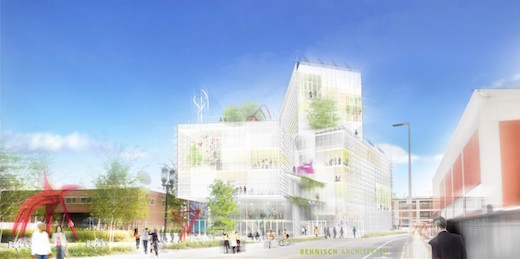
It’s always nice to see sustainable building projects get underway, especially when they’re being built in cities, which must become more energy efficient soon, or else. To this end, the firm Behnisch Architekten has recently unveiled their plans to expand Boston’s EpiCenter into the largest energy-positive commercial building in New England, and maybe even on the entire East Coast. Once finished the building will house the Artists for Humanity charity organization.
Among other technologies, the new EpiCenter will benefit from natural ventilation and daylight, as well as a host of other innovative technologies to make it net positive. To remind, Boston’s EpiCenter building opened its doors in 2004 and was then the first LEED Platinum building in that city. The planned expansion will raise the building’s footprint to 87,000 square feet (8,100 square meters), which will include more space for artists, additional gallery space and more studios. Once it’s done, the building will be entirely self-sustainable, and will be feeding electricity back into the grid.
In as much as possible, the construction will use recycled and locally sourced materials, which will be as low in volatile organic compounds as possible. The building will also be constructed in a way that takes full advantage of the so-called “passive solar tempering”, which is basically the process of moderating internal temperature through the buildings orientation in relation to sunlight. Special glass will be installed, which is capable of controlling the amount of heat radiation that can flow through it. The glass also contains daylight enhancement and redirection elements, which help regulate the internal temperature and provides better natural daylighting. Good insulation, airtightness of the building envelope, along with its high thermal mass will also aid in temperature regulation
Heat recovery systems will also be installed, and there will be a rainwater catchment and a graywater recycling system in place. Energy-efficient LED lighting will be used throughout, which will have daylight-responsive actively manage lighting controls to reduce energy consumption.
To generate electricity, photovoltaic and thermal solar arrays will also be installed, along with geothermal generation. Since the building is still in the planning stages, the architects have yet to provide any figures as to how much energy will be generated, or fed back into the grid. The EpiCenter Expansion is set to be complete by November 2016.
Related Articles on JetsonGreen.com:
Zero Emission Building Capable of Producing Almost Three Times the Energy it Uses
A Family Home That’s as One With Nature
Energy Efficiency in a High Demand Home

Leave a Reply
You must be logged in to post a comment.